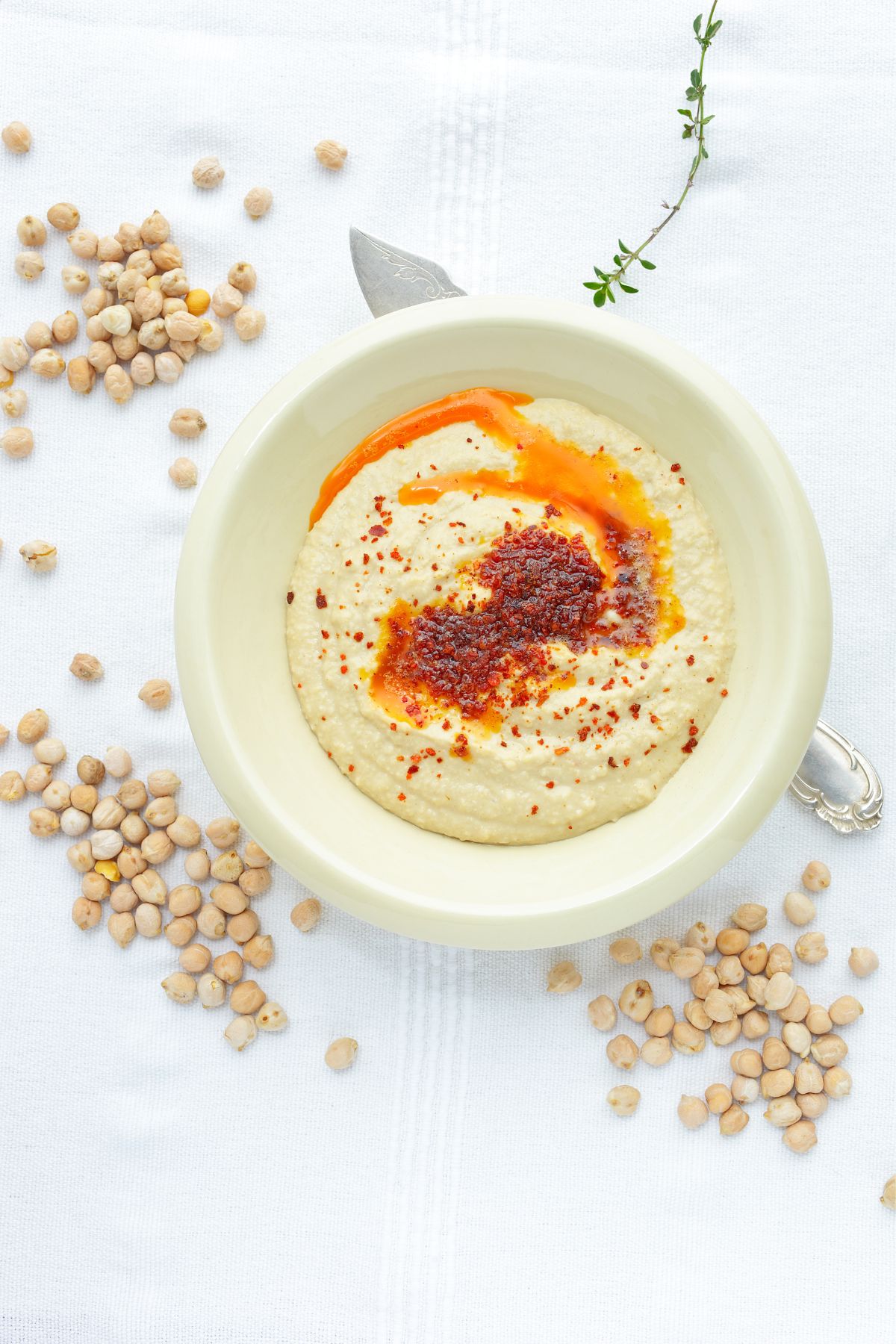Is Hummus Gluten-Free (Homemade & Packaged)?
Hummus is a popular dish usually made with blended chickpeas, tahini, olive oil, lemon juice, and salt. In most cases, homemade hummus is gluten-free, but packaged hummus may have been produced on shared equipment and may have a gluten contamination warning.

Traditional Hummus Ingredients
Hummus is a Middle Eastern dip made by blending chickpeas with tahini and other ingredients and spices. It is commonly used as a dip for bread or crackers or as a spread on sandwiches.
Key ingredients for classic hummus include garbanzo beans (also called chickpeas), sesame paste (also called tahini), fresh lemon juice, and olive oil.
While most homemade hummus is naturally gluten-free, not all store-bought brands are considered 100% gluten-free or safe for people with Celiac disease. This is because the hummus may be prepared on shared equipment and present a cross-contamination risk.
Packaged Hummus Ingredients
The ingredients in store-bought hummus depends on the brand. Some will be certified gluten-free and others will use shared equipment which can present a cross-contamination risk for gluten and other allergens.
As you’ll see, the main ingredients across all the packaged brands are similar. Common ingredients include: chickpeas, tahini, oil, salt, and garlic.
The following is a list of popular brands of hummus as well as their ingredients (note: some ingredients may change over time, so you’ll need to refer to the package label for the most accurate information).
To summarize, Sabra and Ithaca are labeled gluten-free. For Roots, Cedar, Tribe, and Athenos, you should check the packaging for a gluten-free certification to ensure the product is safe for those with gluten sensitivities or celiac disease.
Sabra Hummus
Ingredients: Cooked Chickpeas, Water, Tahini (Ground Sesame), NonGMO Soybean Oil, Garlic, Salt, Non-GMO Citric Acid, and Potassium Sorbate.
Sabra Hummus products are labeled gluten-free, and Sabra is a certified gluten-free brand. Their hummus is processed in a gluten-free facility and is safe for people with celiac disease or gluten sensitivity.
Roots
Ingredients: Garbanzo Beans, Safflower Oil, Tahini, Lemon Juice, Wheat-Free Tamari, Distilled White Vinegar, Cumin, Garlic, Black Pepper, Acacia, and Celtic Sea Salt.
Roots is often labeled as gluten-free, but checking for a certified gluten-free label on the packaging is recommended.
Cedar Organic
Ingredients: Organic Steamed Chickpeas (Organic Chickpeas, Water), Organic Sesame Tahini, Blend of Oils (Organic Sunflower Oil, Organic Extra Virgin Olive Oil), Sea Salt, Organic Garlic, Citric Acid, Organic Cumin, Organic Guar Gum.
Cedar’s Mediterranean Foods offers gluten-free options, including their hummus products. However, to be certain, look for a gluten-free certification symbol on the packaging, as not all of their products may be certified.
Tribe
Ingredients: Cooked Chickpeas (Chickpeas, Water), Water, Tahini (Ground Sesame), Canola Oil, Natural Flavors, Sea Salt, Dry Roasted Garlic, Citric Acid, and Spice.
Tribe hummus is gluten-free, and many of their products are labeled as such. However, they do not explicitly mention certification, so checking for the gluten-free label on the packaging is recommended.
Ithaca
Ingredients: Chickpeas, Water, Tahini, Cold Pressed Lemon Juice, Organic Sunflower Oil, Vinegar, Salt, Fresh Garlic, Cumin, and Crushed Red Pepper.
Ithaca Hummus products are labeled gluten-free. They do not contain gluten ingredients, and they follow gluten-free protocols, although checking for certification on the packaging is recommended.
Athenos
Ingredients: Chickpeas, Water, Tahini (Sesame), High Oleic Sunflower Oil, Salt, Dried Garlic, Citric Acid, Spice, Sorbic Acid (Preservative), Guar Gum.
Athenos hummus does not explicitly state that it is certified gluten-free. While it does not list gluten ingredients, it’s best to check the packaging for a gluten-free certification to be sure.

Risk of Cross-Contamination With Shared Equipment
Cross-contamination occurs when a gluten-free food item comes into contact with a gluten-containing food item, whether directly or indirectly.
The only risk that there would be for packaged hummus to become contaminated with gluten-containing ingredients is if the equipment that is used to make the hummus is shared with gluten-containing ingredients or has not been properly cleaned.
Most packaged hummus brands will note if they are considered 100% gluten-free or if there is a cross-contamination risk. Just be sure to read the fine print on any labels of packaged hummus you buy.
And, of course, if you want to ensure that your hummus dip is certified gluten-free and free from all traces of gluten, then you may need to make it yourself at home.
Other Gluten-Free Dips
There are plenty of other gluten-free dips available on the market. So if you’re looking for a yummy dip to have for a gluten-free snack, read on below for some great options.
- Avocado spread
- Bean dip
- Guacamole
- Salsa
- Ranch
- Salad dressing
- Nut butter
- Hot sauce
- Tartar sauce
While there are many gluten-free dip options available, the above list is not exhaustive. If you’re unsure about whether a particular dip is gluten-free, be sure to check the ingredients or contact the manufacturer.
What Gluten-Free Foods Can I Serve With Hummus?
It’s important to know that many foods including pita bread are almost never gluten-free.
So, if you are served a hummus plate at a restaurant or a friend’s house, you need to make sure that whatever is served with the hummus is gluten-free. Again, most pita breads are not gluten-free.
But, there are many gluten-free foods that go well with hummus. Some options include:
- Gluten-free crackers
- Celery sticks
- Carrot sticks
- Cucumber slices
- Red pepper slices
- Zucchini slices
- Jicama sticks
- Gluten-free pretzels
- Rice cakes
- Boneless, skinless chicken breasts
- Shrimp
- Lettuce wraps
- Cauliflower florets
See my list of what to serve with hummus.
FAQs
No, not all hummus is gluten-free. Most brands of hummus are gluten-free, while others are not due to cross-contamination or filler ingredients. If you are avoiding gluten, making your own hummus at home is best.
It depends on the restaurant. Some restaurants make their hummus from scratch using gluten-free ingredients, while others use store-bought brands that may not be gluten-free. It is best to ask the waitstaff or chef if they can accommodate your dietary needs.
No, pita bread is not gluten-free. Pita bread is made with wheat flour and other gluten-containing ingredients. See my related article, “Is Pita Bread Good For You?“
Yes, most flavored hummus brands are gluten-free. However, there are a few flavors that may contain gluten, so it is always best to check the ingredients list to be sure.
Most hummus recipes and packaged hummus brands are vegan as they do not contain any animal products. But, you should always read the labels to make sure any products only contains plant-based ingredients.
More Hummus Recipes & Resources
More Healthy Gluten-Free Snack Ideas
Conclusions
Hummus is a popular dip made from mashed chickpeas, tahini, olive oil, lemon juice, and garlic. It’s often served with pita bread, vegetables, or chips.
However, not all hummus is gluten-free due to cross-contamination or filler ingredients. If you’re looking for a gluten-free option, there are plenty of other dips available.
So if you are looking for a filling snack with lots of fiber and protein, hummus is a great option! Just be sure to check the ingredients list to ensure that it is gluten-free.
Don’t forget to join my newsletter list to get exclusive clean eating recipes and tips. The newsletter is 100% free with no spam; unsubscribe anytime.
About the Author: Carrie Forrest has a master’s degree in public health with a specialty in nutrition and is studying to be a holistic nutritionist. She is a top wellness and food blogger with over 5 million annual visitors to her site. Carrie has an incredible story of recovery from chronic illness and is passionate about helping other women transform their health. Send her a message through her contact form.
Note: this post is for informational purposes only and is not intended as medical advice. Please consult your healthcare provider for recommendations related to your individual situation.




















